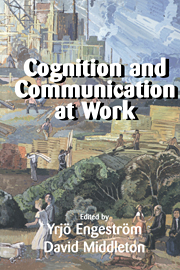Book contents
- Frontmatter
- Contents
- Contributors
- Acknowledgments
- 1 Introduction: Studying work as mindful practice
- 2 Distributed cognition in an airline cockpit
- 3 Constituting shared workspaces
- 4 Seeing as situated activity: Formulating planes
- 5 Convergent activities: Line control and passenger information on the London Underground
- 6 Users and designers in mutual activity: An analysis of cooperative activities in systems design
- 7 System disturbances as springboard for development of operators' expertise
- 8 Expert and novice differences in cognition and activity: A practical work activity
- 9 The tensions of judging: Handling cases of driving under the influence of alcohol in Finland and California
- 10 Talking work: Argument, common knowledge, and improvisation in teamwork
- 11 The collective construction of scientific genius
- 12 Experience and the collective nature of skill
- 13 Working together: Symbolic interactionism, activity theory, and information systems
- 14 On the ethnography of cooperative work
- Index
8 - Expert and novice differences in cognition and activity: A practical work activity
Published online by Cambridge University Press: 05 June 2012
- Frontmatter
- Contents
- Contributors
- Acknowledgments
- 1 Introduction: Studying work as mindful practice
- 2 Distributed cognition in an airline cockpit
- 3 Constituting shared workspaces
- 4 Seeing as situated activity: Formulating planes
- 5 Convergent activities: Line control and passenger information on the London Underground
- 6 Users and designers in mutual activity: An analysis of cooperative activities in systems design
- 7 System disturbances as springboard for development of operators' expertise
- 8 Expert and novice differences in cognition and activity: A practical work activity
- 9 The tensions of judging: Handling cases of driving under the influence of alcohol in Finland and California
- 10 Talking work: Argument, common knowledge, and improvisation in teamwork
- 11 The collective construction of scientific genius
- 12 Experience and the collective nature of skill
- 13 Working together: Symbolic interactionism, activity theory, and information systems
- 14 On the ethnography of cooperative work
- Index
Summary
Introduction
All work activities involve complex forms of practical and creative thinking. Whether that work is work of filling milk cases or writing computer programs. In my view, all work has some intellectual aspect to it.
(Scribner, 1990)Prevailing theories of expertise and the classic model of the difference between expert and novice are predicated on a logical/rationalist model of thinking. Although at present there is no single definition of expertise based on this classic model, “expert” and “novice” are assumed to be fixed psychological categories defined by some “cognitive ideal.” The theory of expertise has been developed primarily in the context of intellectual tasks, wherein specific standards have to be met, e.g., chess (Chase & Simon, 1973), physics problems (Larkin et al., 1980), and medical diagnosis (Patel & Groen, 1986), and recently summarized by Ericsson and Charness (1994). The focus of this research has generally been on problem solving in “well structured” problem domains that lend themselves readily to problem descriptions and identification of linkages between problem representations and linear solution strategies. But does this logical/rationalist model of thinking apply to the more mundane tasks that people face in their everyday life and work? What constitutes problem solving in real-world activities?
The research described in this chapter seeks to address these questions and explore the application of activity theory to the investigation of expert/novice differences in an everyday work task.
- Type
- Chapter
- Information
- Cognition and Communication at Work , pp. 177 - 198Publisher: Cambridge University PressPrint publication year: 1996
- 5
- Cited by



